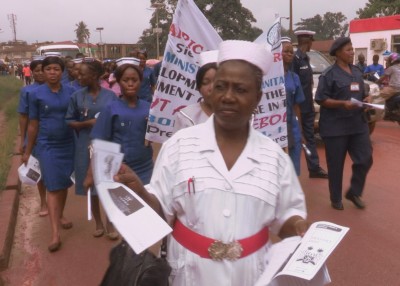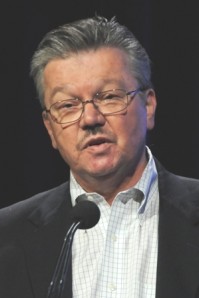Tag: Frontline
Frontline creates cross-platform investigative unit with help from Ford Foundation
Frontline has hired two investigative reporters and promoted a digital specialist to create its first desk producing original investigative journalism across platforms. The ...Fundraising groups focused on public TV shows expand to bring stations under tent
Four specialized charities cultivating big donations to benefit some of PBS’s most popular programs are gaining traction in the crowded and competitive ...CDC requests 200 DVDs of Frontline doc to train workers fighting Ebola
For the second time this year, health professionals have requested copies of a Frontline documentary for training purposes.Frontline receives nearly $6 million in two grants
Frontline, public television’s investigative news showcase, announced two major donations Wednesday, including the largest grant from individuals in its 30-year history. Most of ...Tuesday roundup: Pubmedia inspires poetry volume; ESPN prez responds to Kirk’s “whining”
• I think that I shall never see A poem lovely as Wait Wait … Don’t Tell Me! Granted, that’s probably not among the verses ...Tuesday roundup: Headlee joins GPB, revamped History Detectives premieres July 1
Plus: A Frontline filmmaker wins a WGBH fellowship, and Wait Wait makes a cameo on The Simpsons.Tuesday roundup: RadioLoveFest; Public Integrity’s Pulitzer; digital education doc series
Plus: FiveThirtyEight crunches the numbers on Bob Ross, and noncom radio stations are on the rise.Monday roundup: Polk goes to Frontline, CPB ombud calls for transparency in grant dustup
• Frontline today won a George Polk Award for “League of Denial,” its investigation of the NFL’s efforts to downplay evidence linking head injuries of ...Indie producer Michael Kirk receives honorary degree from his alma mater
Kirk, a key contributor to PBS’s Frontline since its inception, was cited for his body of work in producing more than 200 investigative documentaries. ...ESPN backs away from NFL reporting project with Frontline
Cable network ESPN on Aug. 22 withdrew from its reporting collaboration with Frontline on an investigative documentary project examining the NFL’s allegedly lax ...Grant to Frontline will create its first desk, to oversee news collaborations
Frontline is spending $1.5 million to bolster its ability to manage its news collaborations, which are growing in number as well as importance. ...Frontline teams with PRX to develop iPad app
WGBH's long-running documentary program is partnering with the Public Radio Exchange to develop a free app for iPad users.Arun Rath joins NPR as Weekend ATC host
Frontline and PRI’s The World reporter Arun Rath will join NPR in late September to host Weekend All Things Considered, which is relocating to NPR’s Los Angeles ...Michael Sullivan, veteran Frontline producer, dies at 67
Michael Sullivan, an influential producer for PBS’s Frontline for more than 25 years, died in his home in Marblehead, Mass., on June ...Pubradio contenders dominate radio division of Sigma Delta Chi Awards
Public radio reporters took all nine awards for radio reporting in this year’s Sigma Delta Chi Awards, which recognize outstanding reporting on ...





